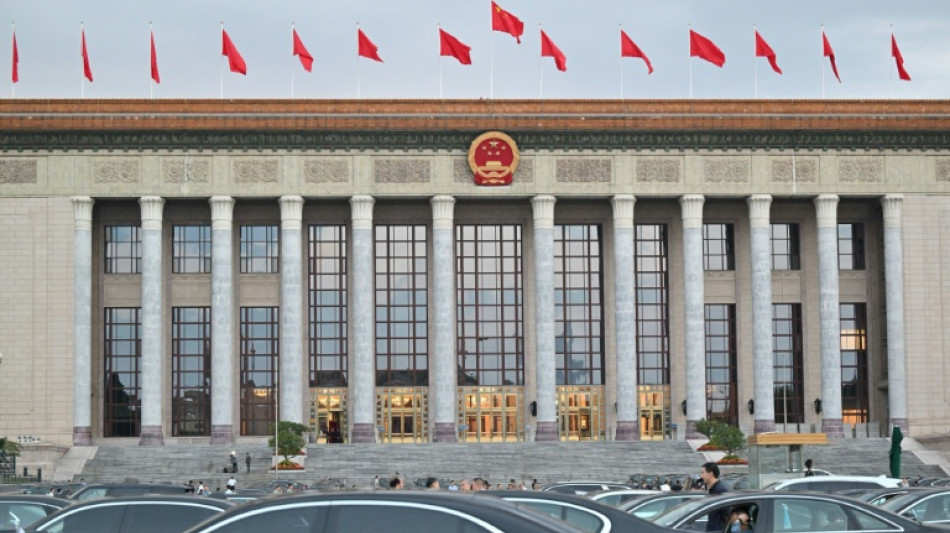
| SCS | 0.12% | 16.14 | $ | |
| RBGPF | 0.12% | 82.5 | $ | |
| CMSC | 0.45% | 23.692 | $ | |
| RYCEF | 3.04% | 17.41 | $ | |
| CMSD | 0.42% | 24.07 | $ | |
| RIO | 0.38% | 97.22 | $ | |
| AZN | 2.64% | 193.1 | $ | |
| GSK | -0.32% | 58.82 | $ | |
| BCE | 0.79% | 25.825 | $ | |
| BCC | 0.72% | 89.67 | $ | |
| NGG | 0.45% | 88.79 | $ | |
| RELX | -0.65% | 29.29 | $ | |
| JRI | -0.27% | 12.775 | $ | |
| VOD | -1.51% | 15.25 | $ | |
| BTI | -1.56% | 60.21 | $ | |
| BP | -6.1% | 36.965 | $ |

Chinese leaders to hash out strategic blueprint at key meeting
China's ruling Communist Party will on Monday kick off four days of key closed-door discussions, formulating core economic strategy for coming years as growth flags and trade headwinds mount.
The gathering of the Central Committee -- an elite body composed of around 200 members and 170 alternates -- will be crucial in determining longstanding policy objectives in the world's second-largest economy.
Foreign media access to attending officials is highly restricted during the event, which typically opens and closes in Beijing's grandiose Great Hall of the People on Tiananmen Square.
The fourth such "plenum" to be held during the current committee's 2022-2027 term, this session will focus on proposals for the 15th five-year plan on economic and social development, state media say.
That plan, which covers the period from next year until 2030, will play a central role in the pursuit of President Xi Jinping's core aims, including technological self-sufficiency and military and economic might.
The plenum, chaired by Xi, is scheduled to conclude on Thursday, after which authorities are expected to release a lengthy document summarising major outcomes.
The wide-ranging plan encompassing political, economic, social and environmental goals will then be approved in March by the legislature.
This month's meeting comes at an uncertain time for the Chinese economy, beset by sluggish domestic spending, a protracted crisis in the property sector and a turbulent trade war with the United States.
"While plenums generally attract less attention than other political events, it is during those plenums that major policies are discussed and being decided upon," wrote Teeuwe Mevissen, senior China economist at Rabobank, in a recent note.
"Given the sheer size of China's economy these decisions also impact the rest of the world," he said.
- Economy in focus -
Typically, it is at the Communist Party's fifth plenum that officials chart the next five-year economic blueprint.
But after an unexplained nine-month delay to the third plenum until July 2024, that monumental task is now expected to fall on the upcoming conclave.
Experts have in recent years argued that China must shift towards an economic model propelled more by domestic consumption as opposed to infrastructure investment and exports -- long key drivers of growth.
Household demand has been sluggish, however, with official data showing this month that consumer prices fell again in September after reaching a half-year low in August.
Another prominent issue officials will likely be seeking to address at the plenum is industrial overcapacity, causing domestic gluts of cheap goods in certain sectors and exacerbating friction with trading partners.
"We look for a more coordinated policy push that addresses overcapacity and strengthens downstream demand," Sarah Tan, economist at Moody's Analytics, told AFP.
"The key test will be whether officials can move beyond rhetoric to deliver concrete measures that revive household spending and confidence," she added.
Just as Monday's secretive proceedings kick off, authorities are also due to announce closely watched economic figures for the third quarter.
An AFP survey of analysts forecasts the data to show overall growth during the July-September period of 4.8 percent -- the slowest in a year.
The fourth plenum will also be closely monitored by observers for any high-level personnel changes as Xi's relentless crackdown on alleged corruption persists.
Tang Renjian, China's former agricultural minister who was sentenced to death with a two-year reprieve last month, is expected to be formally dismissed by the Central Committee at the plenum, according to the Brookings Institution think tank.
The official document released by authorities following the plenum's conclusion on Thursday represents a high-profile messaging opportunity for leaders, Heron Lim, lecturer of economics at ESSEC Business School in Singapore, told AFP.
"Beijing could use this opportunity to address both domestic and international audiences that China's growth ambitions remain intact despite the geopolitical headwinds," said Lim.
F.Laguardia--IM


